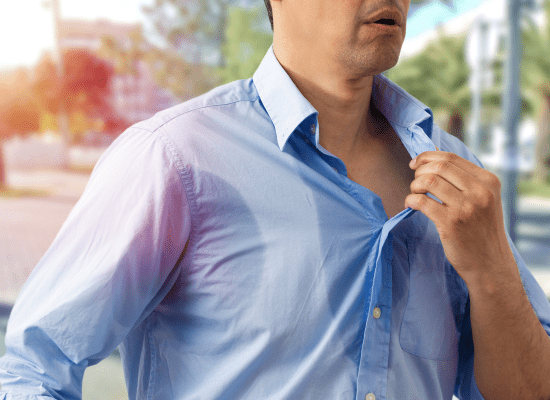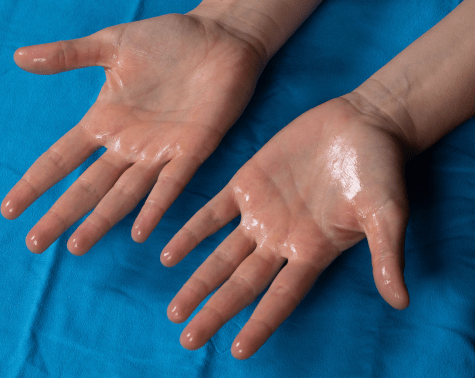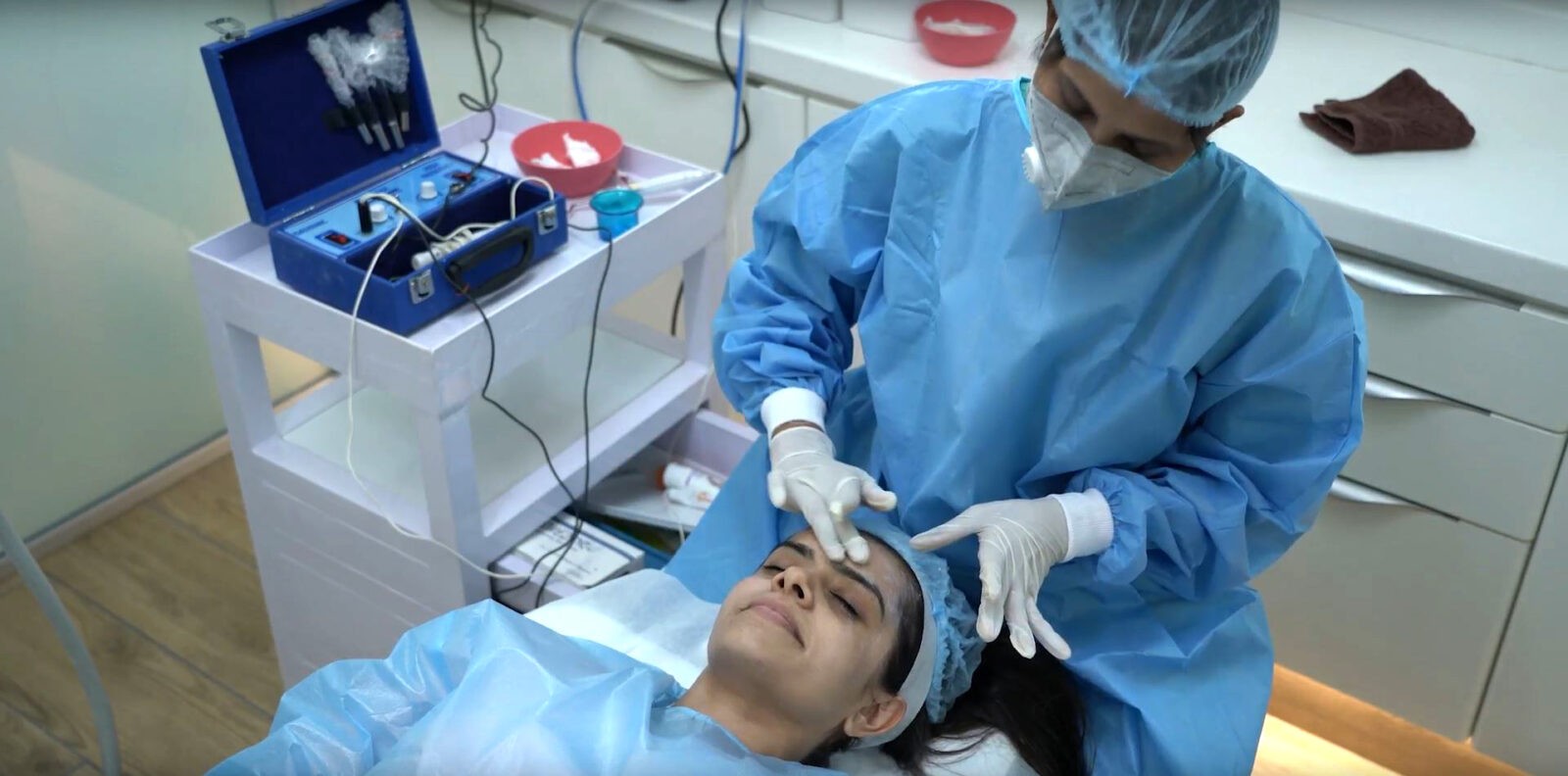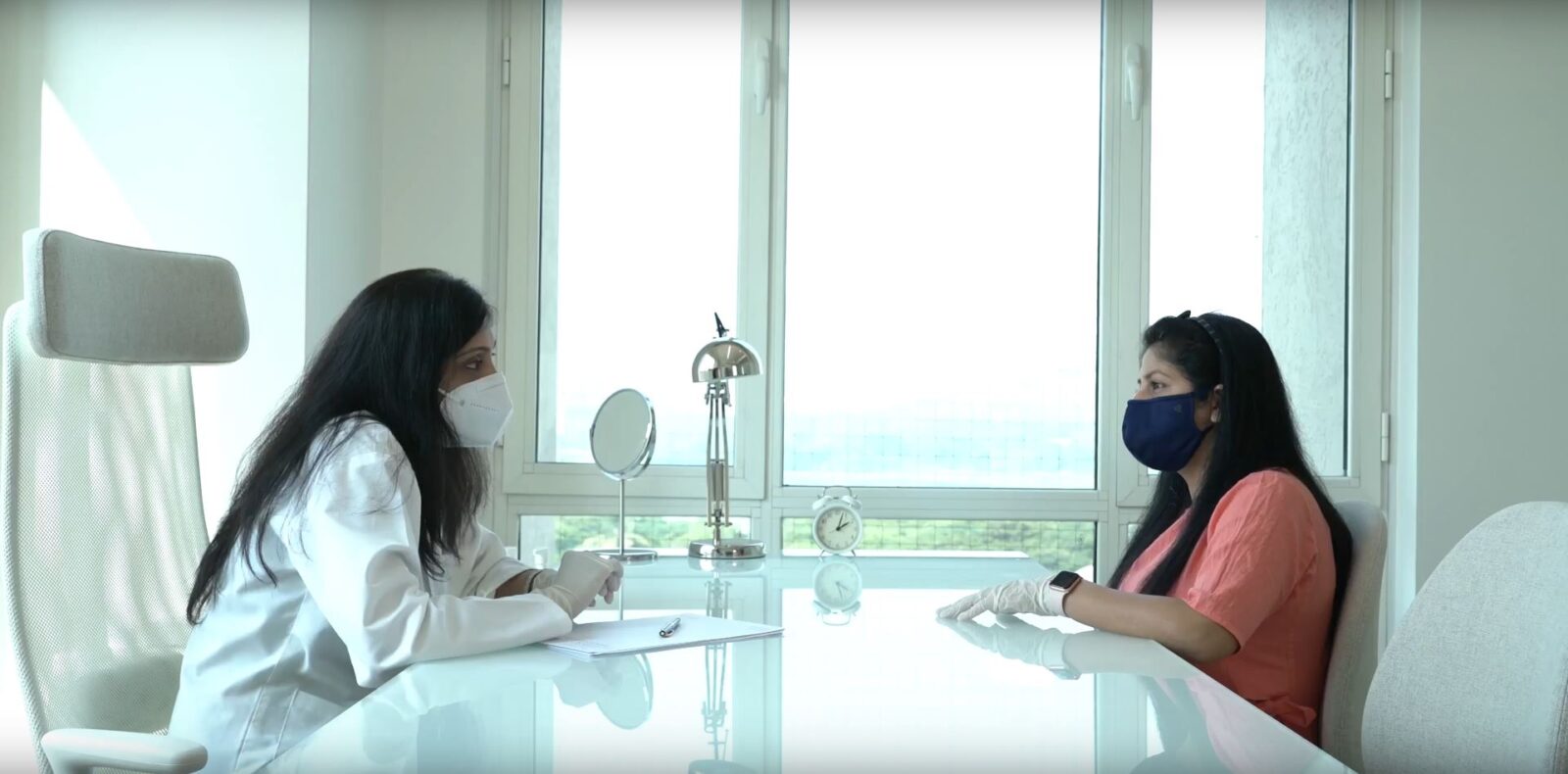






InUrSkn is more than just a skin a hair and body clinic. It is Dr. Sejal's promise of providing minimal intervention patient care which is holistic, personalized and humane.













Primary focal hyperhidrosis is a medical condition characterized by excessive sweating in specific areas like the hands, feet, armpits, and face, without an apparent cause. This localized sweating often begins in childhood or adolescence, affecting social, professional, and personal aspects of an individual’s life. Although non-life-threatening, it can be emotionally and psychologically taxing. Treatment options such as antiperspirants, iontophoresis, Botox injections, and surgery are available to manage and significantly alleviate symptoms, improving the quality of life.
Read More
Secondary Generalized Hyperhidrosis (SGH) stems from underlying medical conditions or medications. Unlike its primary counterpart, SGH typically starts in adulthood and causes sweating on larger or the entire body. Common triggers include diabetes, thyroid issues, or certain medications. It’s vital to address the underlying cause to manage SGH effectively. Treatments may include medication adjustments or addressing the medical condition causing excessive sweating. A healthcare provider can offer a proper diagnosis and suggest a personalized treatment plan to manage symptoms and improve quality of life.
Read More

Hyperhidrosis, characterized by excessive sweating, can significantly impede the quality of life, making everyday activities uncomfortable and often leading to embarrassment and social anxiety. Treatment is advisable to alleviate these symptoms, boost self-confidence, and improve social interactions. Moreover, managing hyperhidrosis can prevent skin infections associated with over-sweating. It’s not merely a cosmetic concern but a health one, with treatments ranging from antiperspirants, iontophoresis, Botox injections to surgical options. Addressing this condition under a healthcare professional’s guidance ensures a tailored approach to treatment, enhancing efficacy, and ensuring safety. Besides improving personal comfort, treating hyperhidrosis promotes mental well-being, aiding individuals in leading a fulfilling, unrestricted lifestyle.

Primary Focal Hyperhidrosis (PFH) is a medical condition characterized by excessive sweating localized to certain areas like the hands, feet, armpits, and face. It is generally symmetric, meaning it affects both sides of the body equally.
Common symptoms include:
Excessive sweating without apparent causes
Sweating interfering with daily activities
Clammy or wet palms and soles
Frequent skin irritation or infections due to moisture
The exact cause of Primary Focal Hyperhidrosis is unknown, but it is believed to be related to overactivity of the sympathetic nervous system. It’s not typically associated with underlying medical conditions and may have a genetic predisposition as it often runs in families.
While PFH may not be entirely preventable, certain measures can help manage symptoms:
Using strong antiperspirants
Wearing breathable, moisture-wicking fabrics
Keeping affected areas clean and dry
Avoiding triggers like spicy foods and caffeine which may worsen sweating
Various treatments can effectively manage PFH, including:
Topical Treatments: Prescription-strength antiperspirants containing aluminum chloride.
Iontophoresis: A device to pass a mild electrical current through the skin.
Botox Injections: Temporarily block the nerves triggering sweat.
Microwave Therapy: Destroying sweat glands via microwave energy.
Surgical Options: Such as sweat gland removal or sympathectomy to cut or clamp the spinal nerves controlling sweating.
In some cases, individuals may experience a decrease in symptoms over time. However, medical treatment is often necessary for significant relief.
No, it’s quite common, affecting millions worldwide.
Yes, it often starts in childhood or adolescence.
Yes, stress and anxiety can exacerbate PFH symptoms.
No, it’s a medical condition unrelated to personal cleanliness.
Certain foods and drinks can trigger sweating; identifying and avoiding these can be beneficial.
Yes, many online and local support groups exist to help individuals cope with PFH.
Exercise can’t cure PFH but can overall improve mood and reduce anxiety, which may help manage symptoms.
Yes, excessive sweating can disturb sleep. It’s advisable to have moisture-wicking bedding and nightwear.
Diagnosis is primarily based on symptoms, medical history, and a physical exam, possibly followed by tests like the sweat test.

Secondary Generalized Hyperhidrosis (SGH) is a medical condition distinguished by excessive sweating over the entire body, often resulting from underlying health conditions or medications.
Common symptoms include:
Excessive sweating affecting the entire body
Night sweats without apparent causes
Sweating interfering with daily routines
Unlike Primary Focal Hyperhidrosis, SGH has identifiable causes, including:
Underlying medical conditions like diabetes, thyroid issues, or infections.
Medication side effects from antidepressants, blood pressure medications, or chemotherapy drugs.
Menopause or hormonal imbalances.
Management of SGH is often focused on addressing the underlying cause:
Treating the underlying medical condition.
Modifying or changing medications under physician guidance.
Keeping the body cool, wearing breathable fabrics, and using antiperspirants.
Treatment options include:
Medication Management: Adjusting current medication or introducing new prescriptions to control sweating.
Systemic Medications: Anticholinergic drugs can help reduce sweating.
Botox Injections: They can be used, albeit in numerous areas due to the widespread nature of sweating in SGH.
It might help to a degree, especially if food allergies or intolerances are contributing to the problem.
Menopausal hot flashes can trigger excessive sweating. Hormone replacement therapy might help manage symptoms.
Chronic wetness can lead to skin infections and discomfort.
Untreated SGH can lead to emotional distress and social withdrawal due to embarrassment.
Treatment success depends on the ability to address the underlying cause.
It may be, depending on the underlying cause and its treatment.
SGH involves sweating all over the body and is caused by an underlying condition, unlike PFH.
Yes, certain medications can trigger SGH.
Through a thorough medical examination, review of medication lists, and possibly some specific tests.
Yes, especially if they have underlying medical conditions or are on medications that trigger hyperhidrosis.


MD, DNB - Dermatology & Venereology
Dr. Sejal has dual degrees of MD and DNB in Dermatology and Venereology. She has worked with some of the senior most doctors in the largest government and private hospitals for more than 15 years. Over these years at InUrSKn, she has treated thousands of patients for a variety of conditions and needs across dermatology, venereology, cosmetology and trichology domains.
Dr. Sejal believes in a minimum intervention approach to health and believes that educating and empowering the patient is the key to good health.
Every patient at InUrSkn is seen personally by Dr. Sejal without any time limit, where she discusses the patient’s concern in detail along with understanding the history of their health and carrying out a personal examination.

At InUrSkn we belive that all patient care must be
– Holistic
– Personalized
– Humane
– Minimal
That is Dr. Sejal and Team live by the philospohy to never prescribe medications or procedures that may not be required and while approaching a concern Dr. Sejal ensures that a detailed history and context is understood by her. Medical tests are prescribed by Dr. Sejal when she believes that there is more to the concern which needs to be addressed and only then the patient can truly benefit.
Multiple spacious procedure rooms
Full-fledged operation theatre
In-house laboratory
Latest technology
100+ Skin, Hair & Body Procedures offered
Frequent disinfection of all clinic spaces with UVC light and WHO-approved chemicals
Large waiting and treatment areas to ensure social distancing
Regular health checks for all patients and staff
Safer than salons, chain-clinics & hospitals
PPEs for patients and staff
Personal attention from Dr. Sejal Saheta (MD, DNB) - with 15+ years of experience
CIDESCO-certified aestheticians with minimum 3 years work experience
500+ Positive Reviews on Practo and Google
5000+ Patients treated last year alone
8000+ Procedures completed
| Prices | ||
|---|---|---|
| Procedure | ||
| In Clinic Consultation with Dr. Sejal | ||
| In Clinic Consultation with Dr. Sejal | ₹1100 | |
| Online Consultation with Dr. Sejal | ||
| Online Consultation with Dr. Sejal | ₹900 | |
Pricing (Inclusive of taxes)


Factors like stress, hot weather, caffeine, and spicy foods can exacerbate symptoms.
Yes, conditions like diabetes, thyroid problems, or nervous system disorders can trigger hyperhidrosis.
While not directly related, obesity can exacerbate sweating due to increased body heat and fat insulation.
Home remedies may include baking soda, apple cider vinegar, or herbal teas; however, their efficacy isn’t well-proven.
It can be either, depending on the cause. For instance, secondary hyperhidrosis may resolve with treatment of the underlying condition.
No, hyperhidrosis is not a contagious condition.
Yes, jobs with high stress or physical exertion can exacerbate symptoms.
It can lead to embarrassment, social anxiety, depression, or low self-esteem due to self-consciousness about sweating.
They may help if anxiety or depression triggers sweating, but they aren’t a direct treatment for hyperhidrosis.
OTC antiperspirants can be a first-line option for mild cases, but prescription antiperspirants are often needed for more severe cases.
Yes, though primary focal hyperhidrosis often starts in childhood or adolescence while secondary usually begins in adulthood.
Yes, hormonal changes like those during puberty, pregnancy, or menopause can trigger or worsen hyperhidrosis.
Yes, primary focal hyperhidrosis often has a genetic link and can run in families.
Yes, laser therapy can target and destroy sweat glands, providing a treatment option for hyperhidrosis.
Alcohol can trigger or worsen sweating in some individuals and should be moderated.


Ready to book an appointment?
BOOK

Want to talk about your needs ?
MAKE AN enquiry
